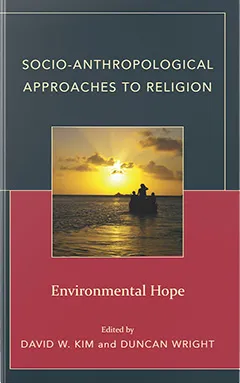
We are glad to announce the release of a new book Socio-Anthropological Approaches to Religion: Environmental Hope, co-edited by David W. Kim, a Professor at the Australian National University and Kookmin University, Seoul, and also a member of our Scientific Committee, with Duncan Wright, an Associate Professor at the Australian National University’s School of Archaeology and Anthropology.
Socio-Anthropological Approaches to Religion: Environmental Hope
David W. Kim
Australian National University / Kookmin University, Seoul
The Cambridge Dictionary defines the notion of ‘hope’ as a desirable thought ‘to want something to happen or to be true and usually have a good reason to think that it might’. The socio-cultural scope of hope covers the limitations of science and technology when they fail in their expected capacities. Even NASA astronauts and ground staff members in a personal sphere hope for the success of their space mission, even though their scientific logic is perfectly ready. The human behaviour of hope is a psychological anchor of confidence and security in any personal circumstance.
The idea of ‘environmental hope’ in this volume is not different. Additionally, it implies temporary figures of the subject in the context of religion’s ecological and anthropological behaviour. Under the pandemic (2020–2023), global communities, social classes and different generations often held onto hope. How did the personal concerns of health, job, family, travel, and communication come to include the invisible and intangible concept of metaphysical security?
Environmental Hope interprets the fundamental functions of spirituality through the theories and practices of hope and understanding the futuristic aspiration of new religious movements. The book portrays a neutral notion of hope that can be either religious or humanistic in the face of the suffering or despair of present reality. The concept of hope (or hopelessness) is demonstrated under the global circumstance of health risk and religious and political persecution.
The insecure situation that creates the expectation of hope is particularly demonstrated where case studies of terrorist attacks, immigration, volunteering behaviour, religious education and medieval Islamic tradition indicate social imbalance. This book examines hope as a crucial element of human’s internal healing beyond medical technology.





